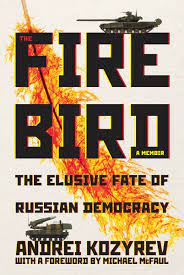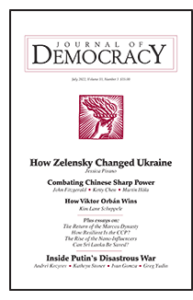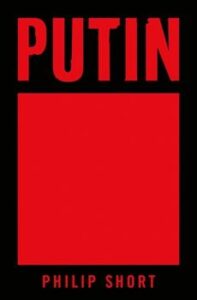Russian President Vladimir Putin‘s attempts to garner support for his country among other nations amid his widely condemned war in Ukraine demonstrates that Russia is in a “weak position,” according to an expert, Newsweek reports:
Kurt Volker, a distinguished fellow at the Center for European Policy Analysis (CEPA) and former U.S. special representative for Ukraine negotiations, was asked during a UATV interview published Tuesday why Russia was seeking companions in countries that are “outcasts.” Volker responded that any countries that are economically and politically capable on their own “want to keep a distance” from Russia and “don’t approve of Russia’s unprovoked aggression.”
 Putin is waging war not just against Ukraine, but against the west, says Constanze Stelzenmüller, the Fritz Stern Chair at the Brookings Institution. And Germany is the fulcrum where he must apply maximum force to break up Europe and the alliance, she writes for The Financial Times:
Putin is waging war not just against Ukraine, but against the west, says Constanze Stelzenmüller, the Fritz Stern Chair at the Brookings Institution. And Germany is the fulcrum where he must apply maximum force to break up Europe and the alliance, she writes for The Financial Times:
The latest polls still show strong support for Ukraine, and for decoupling from Russian fossil fuels; but it is diminished, and shows a clear east-west divide. Eastern mayors and state legislators have warned of “massive social tensions”. The minister president of Saxony wants the war in Ukraine to be “frozen”, his Bavarian counterpart calls for “thinking of our own people”. The frictions between the three government coalition partners are beginning to show.
A bizarrely self-congratulatory Russian propaganda video (above) that recently went viral said: “Winter is Coming [Time to Move to Russia],” she adds. But conceding to the Kremlin by pushing Ukraine towards an armistice and putting Nord Stream 2 into operation would be political suicide.
 In addition to deepening totalitarianism in Russia, Vladimir Putin is exporting his designs abroad in the hopes of helming a new “antidemocracy international,” says Andrei Kozyrev, the Russian Federation’s first foreign minister and author of the 2020 memoir, The Firebird: The Elusive Fate of Russian Democracy.
In addition to deepening totalitarianism in Russia, Vladimir Putin is exporting his designs abroad in the hopes of helming a new “antidemocracy international,” says Andrei Kozyrev, the Russian Federation’s first foreign minister and author of the 2020 memoir, The Firebird: The Elusive Fate of Russian Democracy.
Many believed that Russia would win quickly and easily. As Washington was warning of the massive Russian military buildup on the Ukrainian border, Chinese president Xi Jinping and Putin met on 4 February 2022, ahead of the Beijing Olympics. They signed a long communiqué outlining future areas of cooperation and claimed there were “no limits” to their commitments.
Despite similarities, however, the leaders of the Antidemocracy International have no unifying or consistent set of ideas, he writes for the Journal of Democracy. They simply want power for themselves. It is only the rejection of democracy that brings them together.
Indeed, China and Russia often appear as a pair, two great authoritarian powers seeking to revise the international order, notes Alexander Gabuev, Senior Fellow at the Carnegie Endowment for International Peace. But theirs is not a relationship of equals. The Kremlin’s dependence on China will turn Russia into a useful instrument in a larger game for Zhongnanhai [the CCP HQ], a tremendous asset in Beijing’s competition with Washington, he writes for Foreign Affairs:
 In Moscow, reality is kicking in. Even before the war in Ukraine, the Sino-Russian relationship had been increasingly one-sided. Many Russian officials, including in the highest echelons of power, feared that getting closer to China—without simultaneously improving relations with Western countries and making the Russian economy more competitive—would end up restricting Russia’s strategic autonomy. But ties with China nevertheless grew steadily. RTWT
In Moscow, reality is kicking in. Even before the war in Ukraine, the Sino-Russian relationship had been increasingly one-sided. Many Russian officials, including in the highest echelons of power, feared that getting closer to China—without simultaneously improving relations with Western countries and making the Russian economy more competitive—would end up restricting Russia’s strategic autonomy. But ties with China nevertheless grew steadily. RTWT
Three decades after the collapse of the Soviet empire, Russians are being dragged back in time to when Soviet citizens lived isolated from the rest of the world, in a bubble of failed ideology and misinformation, adds Kathryn Stoner, Mosbacher Director at Stanford University’s Center on Democracy, Development and the Rule of Law, and senior fellow at the Hoover Institution. That system fell apart under just the kind of autarky and autocracy that Putin hopes to reimpose. Just as the Soviet system collapsed, Putin is also failing Russia, erasing the gains of the postcommunist period in a feckless attempt to rebuild a doomed empire, she writes for the Journal of Democracy.
The war has set in motion a public race to succeed Putin, according to Carnegie analyst Andrei Pertsev. In recent years, political maneuvering in Russia was kept in the shadows, but in this new era, loud proclamations and high-visibility political gesturing are again the norm, he writes for The Moscow Times:
It is as though an active election campaign is already under way, with bureaucrats and functionaries within the ruling party doing their best to get into the limelight and even attacking one another. Until recently, such behavior was almost unthinkable: the presidential administration worked in silence, while high-status functionaries at the ruling United Russia party restricted themselves to making promises on social policies.
 On the other hand….. Such predictions might find it useful to factor in other propositions gleaned from recent digests when pondering whether the invasion of Ukraine (or another reason) will spark the beginning of Putin’s end, Russia Matters suggests:
On the other hand….. Such predictions might find it useful to factor in other propositions gleaned from recent digests when pondering whether the invasion of Ukraine (or another reason) will spark the beginning of Putin’s end, Russia Matters suggests:
- First, the Russian economy’s performance in 2022 has exceeded expectations. The IMF’s latest World Economic Outlook upgraded Russia’s GDP estimate for this year by a remarkable 2.5 percentage points….. “Russia’s economy is estimated to have contracted during the second quarter by less than previously projected, with crude oil and non-energy exports holding up better than expected,” the report said.
- Second, some of Russia’s own best thinkers—who have no love lost for Putin—and some of the country’s top business leaders acknowledge that Putin has actually strengthened his grip on power as elites continue to support him…..RTWT
Conceding to the Kremlin by pushing Ukraine towards an armistice and putting Nord Stream 2 into operation would be political suicide, @BrookingsInst‘s @ConStelz writes for @FT https://t.co/akUrt0eifY
— Democracy Digest (@demdigest) August 10, 2022







